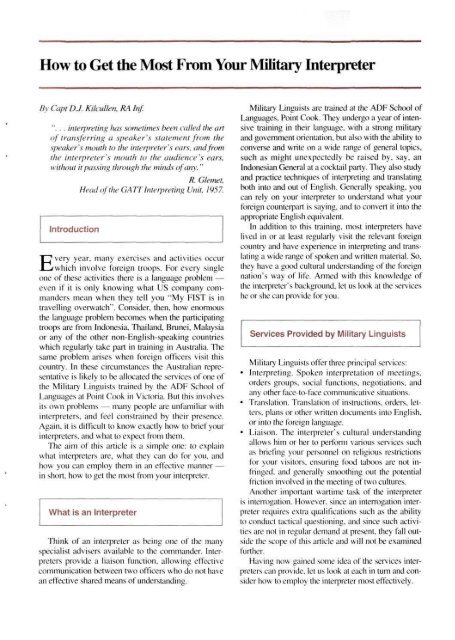ISSUE 107 : Jul/Aug - 1994 - Australian Defence Force Journal
ISSUE 107 : Jul/Aug - 1994 - Australian Defence Force Journal
ISSUE 107 : Jul/Aug - 1994 - Australian Defence Force Journal
Create successful ePaper yourself
Turn your PDF publications into a flip-book with our unique Google optimized e-Paper software.
How to Get the Most From Your Military InterpreterBy Capt D.J. KilcuUen, RA Inf.". . . interpreting has sometimes been called the artof transferring a speaker's statement from thespeaker's mouth to the interpreter's ears, and fromthe interpreter's mouth to the audience's ears,without it passing through the minds of any. "R. (ilemet.Head of the GATT Interpreting Unit. 1957.IntroductionEvery year, many exercises and activities occurwhich involve foreign troops. For every singleone of these activities there is a language problem —even if it is only knowing what US company commandersmean when they tell you "My FIST is intravelling overwatch". Consider, then, how enormousthe language problem becomes when the participatingtroops are from Indonesia. Thailand. Brunei. Malaysiaor any of the other non-English-speaking countrieswhich regularly take part in training in Australia. Thesame problem arises when foreign officers visit thiscountry. In these circumstances the <strong>Australian</strong> representativeis likely to be allocated the services of one ofthe Military Linguists trained by the ADF School ofLanguages at Point Cook in Victoria. But this involvesits own problems — many people are unfamiliar withinterpreters, and feel constrained by their presence.Again, it is difficult to know exactly how to brief yourinterpreters, and what to expect from them.The aim of this article is a simple one: to explainwhat interpreters are. what they can do for you. andhow you can employ them in an effective manner —in short, how to get the most from your interpreter.What is an InterpreterThink of an interpreter as being one of the manyspecialist advisers available to the commander. Interpretersprovide a liaison function, allowing effectivecommunication between two officers who do not havean effective shared means of understanding.Military Linguists are trained at the ADF School ofLanguages. Point Cook. They undergo a year of intensivetraining in their language, with a strong militaryand government orientation, but also with the ability toconverse and write on a wide range of general topics.such as might unexpectedly be raised by, say, anIndonesian General at a cocktail party. They also studyand practice techniques of interpreting and translatingboth into and out of Fnglish. Generally speaking, youcan rely on your interpreter to understand what yourforeign counterpart is saying, and to convert it into theappropriate English equivalent.In addition to this training, most interpreters havelived in or at least regularly visit the relevant foreigncountry and have experience in interpreting and translatinga wide range of spoken and written material. So.they have a good cultural understanding of the foreignnation's way of life. Armed with this knowledge ofthe interpreter's background, let us look at the serviceshe or she can provide for you.Services Provided by Military LinguistsMilitary Linguists offer three principal services:• Interpreting. Spoken interpretation of meetings,orders groups, social functions, negotiations, andany other face-to-face communicative situations.• Translation. Translation of instructions, orders, letters,plans or other written documents into English,or into the foreign language.• Liaison. The interpreter's cultural understandingallows him or her to perform various services suchas briefing your personnel on religious restrictionsfor your visitors, ensuring food taboos are not infringed,and generally smoothing out the potentialfriction involved in the meeting of two cultures.Another important wartime task of the interpreteris interrogation. However, since an interrogation interpreterrequires extra qualifications such as the abilityto conduct tactical questioning, and since such activitiesare not in regular demand at present, they fall outsidethe scope of this article and will not be examinedfurther.Hav ing now gained some idea of the services interpreterscan provide, let us look at each in turn and considerhow to employ the interpreter most effectively.
















